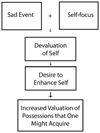Misery is not miserly: sad and self-focused individuals spend more
- PMID: 18578840
- PMCID: PMC4142804
- DOI: 10.1111/j.1467-9280.2008.02118.x
Misery is not miserly: sad and self-focused individuals spend more
Abstract
Misery is not miserly: Sadness increases the amount of money that decision makers give up to acquire a commodity. The present research investigated when and why the misery-is-not-miserly effect occurs. Drawing on William James's concept of the material self, we tested a model specifying relationships among sadness, self-focus, and the amount of money that decision makers spend. Consistent with our Jamesian hypothesis, results demonstrated that the misery-is-not-miserly effect occurs only when self-focus is high. That is, self-focus moderates the effect of sadness on spending. Moreover, mediational analyses revealed that, at sufficiently high levels, self-focus mediates (explains) the relationship between sadness and spending. Because the study used real commodities and real money, the results hold implications for everyday decisions, as well as implications for the development of theory. For example, economic theories of spending may benefit from incorporating psychological theories -- specifically, theories of emotion and the self -- into their models.
Figures



References
-
- Aiken LS, West SG. Multiple regression: Testing and interpreting interactions. Thousand Oaks, CA: Sage; 1991.
-
- Ashmore RD, Jussim L. Toward a second century of the scientific analysis of self and identity: Introduction. In: Ashmore RD, Jussim L, editors. Self and identity: Fundamental issues. New York: Oxford University Press; 1997. pp. 3–19.
-
- Babcock L, Loewenstein G. Explaining bargaining impasse: the role of self-serving biases. Journal of Economic Perspectives. 1997;11:109–126.
-
- Baron RM, Kenny DA. The moderator-mediator variable distinction in social psychological research: Conceptual, strategic, and statistical considerations. Journal of Personality and Social Psychology. 1986;51:1173–1182. - PubMed
-
- Beggan JK. On the social nature of nonsocial perception: The mere ownership effect. Journal of Personality and Social Psychology. 1992;62:229–237.
Publication types
MeSH terms
Grants and funding
LinkOut - more resources
Full Text Sources

